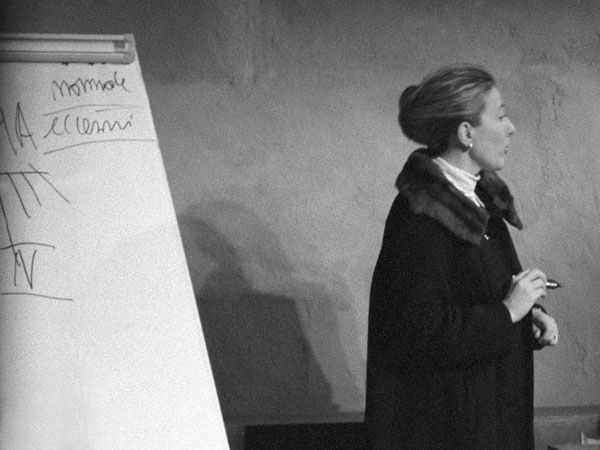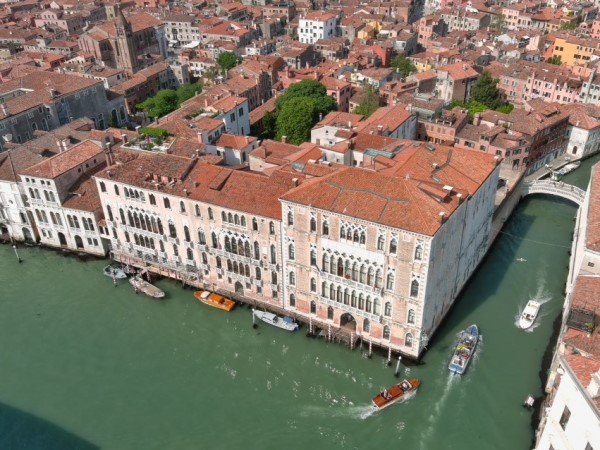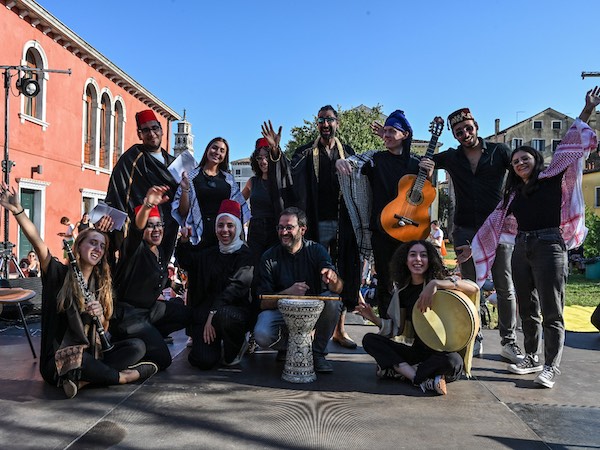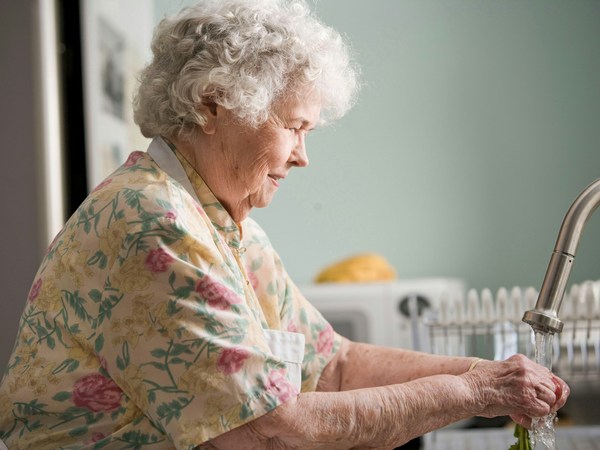Double appointment at Ca’ Foscari Theatre for ‘The banality of evil', on stage Wednesday, January 25th at 8.30pm and Thursday, January 26th at 5:30pm.
Thursday, January 26th 2017 at 11.00am, at Ca’ Foscari Theatre, Paola Bigatto meets with students. Bruna Bianchi and Isabella Adinolfi will also participate. The meeting is free admission and open to students until all available places are filled.
The shows and the meeting of the day on January 26th are proposed in coordination with the occasion of the initiatives for Holocaust Memorial Day organized at Ca’ Foscari.
Hannah Arendt (1906 - 1975), philosopher, student of Heidegger and Jaspers, emigrated in 1933 from Germany to France, and from there to America in 1940 because of racial persecution. In 1961 as correspondent of The New Yorker, she followed the Eichmann trial in Jerusalem. The report raised a huge wave of protests and a heated debate especially by the international Jewish community, because of the particular interpretation Arendt, Jewish and German, gave to the phenomenon of the Holocaust and anti-Semitism in Germany. Otto Adolf Eichmann was given the role of logistically implementing the "final solution", ie the extermination of the Jews in order to make German territories ‘judenrein’ – free of jews. Eichmann escaped at the Nuremberg trials and became a refugee in Argentina before he was finally captured by the Israeli Secret Service, tried in Jerusalem and sentenced to death.
"[...] Eichmann never knew what he was doing. He was not a stupid man, he simply had no ideas, a very different thing from stupidity. And that lack of ideas predisposed him to become one of the biggest criminals of his time, because a lack of ideas, a remoteness from reality, can be much more dangerous of all those evil instincts that are believed to be innate in humans. This was the lesson of the trial in Jerusalem."
Hannah Arendt observes the machinery of justice in Israel with an unrelenting critical eye. She does not hesitate to investigate the moral and direct responsibility of the Jewish people in the Holocaust tragedy nor to attribute to the entire German people heavy responsibilities under the Nazis and hypocritical guilt during post-war reconstruction. She discovered that it is the lie elected to the system of social life and politics that is the main architect of the Nazi tragedy, the lie as an existential strategy implemented primarily against themselves: the ability to deny the truth is known as the criminal mechanism that allows evil to appear trivial, unknowingly acted out by people who, like Eichmann, seem genuinely amazed by their attribution of this responsibility. Those who have escaped this mechanism show with their lives, their example and often their sacrifice, that judgment that exempts us from committing evil does not come from a particular culture, but by the ability to think. And where this ability is absent, there is the "banality of evil." With the political and social sense, as well as education, this operation, which was created in the classroom and developed as a lecture, therefore it is not only in historical and philosophical content to which reference is made, but is above all a moral example offered by Arendt: the relentlessness of being painfully objective to severely stress the unspoken truth by both parties to the proceedings. The passionate and polished look of Arendt is an extremely topical lesson. [Paola Bigatto]
Paola Bigatto, Philosophy graduate from the University of Genoa and also a graduate of the Paolo Grassi School of Dramatic Arts in Milan, is an actress, director and Drama Professor. After her debut under the guidance of Giancarlo Cobeli, she has worked with some of the most important directors to enter the prestigious world of Italian theater. She acted in several plays directed by Luca Ronconi, including Strange Interlude, Eugene O'Neill; The last days of humanity, Karl Kraus; The dream, by August Strindberg and What Maisie Knew by Henry James. She collaborated with the Teatro delle Albe in Ravenna, taking part in the Extermination of Werner Schwab, directed by Marco Martinelli.
Student and collaborator of Renata Molinari, with which "Passi walk, meet, stop" was realized (for the CRT, the ETI and the Theatre of Ropma), a walking path from Piacenza to Rome along the Via Francigena. In 2003 she debuted in the Banality of Evil as Hannah Arendt, curating the reduction and adaptation to the part besides being an interpreter. In 2005 she made her debut as a director with Le morbinose by Carlo Goldoni, for the Borgio Verezzi Festival. In the theatrical season of 2015/2016 she directed Virtù dell’oscurità, taken from the Three Guineas of Virginia Woolf, in collaboration with Lisa Capaccioli, and protagonist Elena Ghiaurov.
She has developed and continues to develop intense pedagogical activity. She worked alongside Luca Ronconi by teaching at the School of the Piccolo Teatro of Milan and taught poetic diction and acting at the Paolo Grassi School of Dramatic Arts in Milan. She currently teaches within the "Luca Ronconi" Piccolo Teatro di Milano, the Nico Pepe of Udine Civic Academy of Dramatic Art. With the Venetian Theatre Academy of Venice, she has edited several educational projects in collaboration with various institutions in the city, including the Study Centre for Documental Research on Theatre and European Melodrama of the Giorgio Cini Foundation of Venice; the Museum of Casa Goldoni and the La Fenice Theatre.
In 2012 The civil actor of Paola Bigatto and Renata Molinari was published by the Titivillus publisher.
Tickets for the two shows can be purchased on Wednesday, January 25th from 5.00pm to 8.00pm and Thursday, January 26th from 3.00pm to 5.00pm at the Ca’ Foscari Theatre ticket office in Santa Marta, Dorsoduro 2137.











